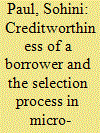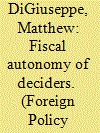|
|
|
Sort Order |
|
|
|
Items / Page
|
|
|
|
|
|
|
| Srl | Item |
| 1 |
ID:
141856


|
|
|
|
|
| Summary/Abstract |
We assess how investors evaluate sovereign borrowers, arguing that sovereign risk is less “sovereign” than previous research assumes. Investors evaluate governments based not only on what they do, but also on investors' views of similar, “peer” countries. Professional investors use investment categorizations (geography, sovereign credit rating, or level of market development) as a heuristic device. As a result, peer country effects, as well as country-specific and global factors (booms, crises, or shocks), should explain sovereign interest rates. The peer effects we expect are regular features of international capital markets, rather than phenomena that occur in periods of market turmoil. We assess our expectations using error correction models of monthly sovereign risk premiums, which reveal significant interdependencies in sovereign risk assessments among countries, net of global and domestic predictors. Such contagion emerges principally in the short term, although we also find robust, long-term ties in sovereign risk assessments among countries sharing common regional classifications. Hence, our evidence suggests that professional investors' reliance on country categorizations facilitates the transmission of market sentiments—which include lower as well as higher risk premiums charged—across groups of countries, even when countries differ in key measures of creditworthiness. Our analyses highlight the importance of investors' ideas regarding country categorizations; they call into question the efficiency of sovereign debt markets.
|
|
|
|
|
|
|
|
|
|
|
|
|
|
|
|
| 2 |
ID:
128309


|
|
|
|
|
| Publication |
2014.
|
| Summary/Abstract |
This article examines whether urban micro-finance institutions (MFIs) consider proxy/hidden collateral in the absence of physical as well as social collateral in judging the creditworthiness of a borrower. MFIs operating in urban slums often adopt an individual lending mechanism since borrowers are not willing to bear joint liability due to the acute problem of migration. Therefore, urban MFIs that offer individual loans are extra-cautious about minimising default risk. This article studies whether MFIs consider ownership of a room in a slum as a hidden selection criterion in a loan programme. Room ownership indicates stability in a particular location, and also indicates the income-generation capability of an aspirant borrower. We use a primary survey database collected from a non-governmental organisation, Navnirman Samaj Vikas Kendra, which provides micro-credit in four slums of north Mumbai in India. We find that the probability of getting selected in a micro-credit programme is significantly higher if a loan applicant owns a room than if the applicant lives in a rented room. MFIs appear to be more concerned about shielding themselves from default than fulfilling the broad goal of maximising social welfare by reaching the poorest of the poor. We present our study with the caveat that the results may not be generalisable, since they are based on a case study.
|
|
|
|
|
|
|
|
|
|
|
|
|
|
|
|
| 3 |
ID:
140282


|
|
|
|
|
| Summary/Abstract |
Liberal theory claims that the constraint taxpayers impose on military expenditure is an important mechanism through which democracy and international commerce help prevent conflict. However, leaders with affordable access to sovereign credit have often overcome this constraint by raising revenue on credit markets. By minimizing or deferring the economic burden imposed on taxpayers and the macroeconomic stress associated with alternative financing strategies, I argue that these leaders have greater autonomy to pursue an aggressive foreign policy if they so desire. Leaders that lack creditor confidence risk increased political opposition and removal from office if hostilities generate macroeconomic stress or disturb the domestic fiscal balance. They also face a higher likelihood of defeat or retreat, and the subsequent political consequences, if they pursue conflict without sufficient resources. Estimates of a heteroskedastic probit model support this hypothesis and indicate that creditworthy states initiate conflict with a greater mean probability and greater variance than their noncreditworthy counterparts.
|
|
|
|
|
|
|
|
|
|
|
|
|
|
|
|
|
|
|
|
|